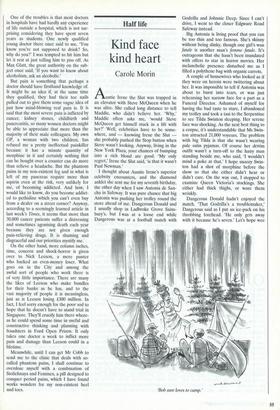Low life
Spare me the pain
Jeffrey Bernard
Iam not quite sure what to think about doctors. I have been in hospital so many times since 1965 when I had my first attack of pancreatitis that I feel almost as though some of them are family. I loathe the way they play at being God, I dislike their love of manipulating their more stupid patients, their total lack of understanding of alco- holism, but most of all I hate them for their meanness and narrow-mindedness about dispensing pain relief.
No human being should have to suffer agony if it is avoidable and certainly no one need die in great pain. Their professed anx- iety that people might become addicted to morphine-based drugs is an utter non- starter. What matters if a man with one month to live becomes an addict? The Middlesex Hospital is not too bad about it in my experience but even there I have known people with cancer who, with only a matter of weeks to live, have been told to stop smoking and even disallowed a drink or two. One of the troubles is that most doctors in hospitals have had hardly any experience of life outside a hospital, which is not sur- prising considering they have spent seven years as students. One newly qualified young doctor there once said to me, 'You know you're not supposed to drink? So, why do you?' I was tempted to hit him but let it rest at just telling him to piss off. As Max Glatt, the great authority on the sub- ject once said, 'If you want to know about alcoholism, ask an alcoholic.'
But pain is something that perhaps a doctor should have firsthand knowledge of. It might be an idea if, at the same time they qualified, they had their toe nails pulled out to give them some vague idea of just how mind-blowing real pain is. It is said that the most severe pain is inflicted by cancer, kidney stones, childbirth and pancreatitis, so many women doctors might be able to appreciate that more than the majority of their male colleagues. My own GP, a woman with two children, has refused me a pretty ineffectual painkiller because it has a minute quantity of morphine in it and certainly nothing that can be bought over a counter can do more than relieve a headache. But the phantom pains in my non-existent leg and in what is left of my pancreas require more than aspirin even at the risk, very unlikely for me, of becoming addicted. And how, I would like to know, do you become addict- ed to pethidine which you can't even buy from a dealer on a street corner? Anyway, according to a seemingly learned article in last week's Times, it seems that more than 30,000 cancer patients suffer a distressing and sometimes agonising death each year because they are not given enough pain-relieving drugs. It is shaming and disgraceful and our priorities mystify me.
On the other hand, more column inches, time, concern and shock-horror is given over to Nick Leeson, a mere punter who backed an even-money loser. What goes on in the City and among the awful sort of people who work there is of very little importance. There are many the likes of Leeson who make bundles for their banks as he has, and to the vast majority of people it is meaningless, just as is Leeson losing £300 million. In fact, I feel sorry enough for the poor sod to hope that he doesn't have to stand trial in Singapore. They'll crucify him there where- as he could spend some time in useful and constructive thinking and planning with fraudsters in Ford Open Prison. It only takes one doctor a week to inflict more pain and damage than Leeson could in a lifetime.
Meanwhile, until I can get Mr Cobb to send me to the clinic that deals with so- called phantom pains, I shall continue to overdose myself with a combination of Stolichnaya and Feminex, a pill designed to conquer period pains, which I have found works wonders for my non-existent heel and toes.



































































 Previous page
Previous page